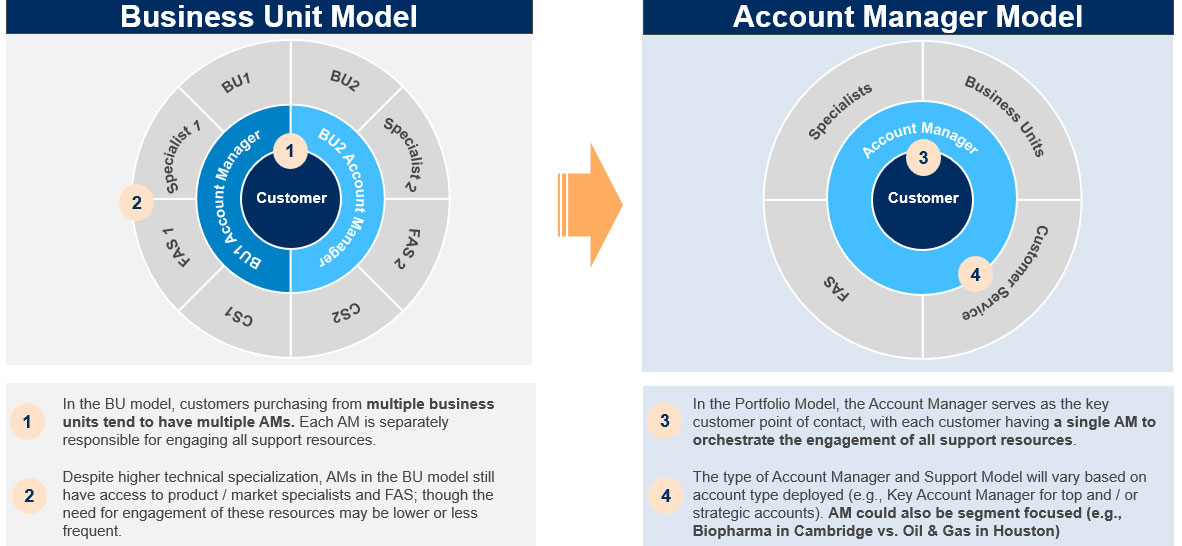I prefer going to one contact. It makes my life easiest, and they will better know who the right person to forward my request to or who to bring in. Someone who knows my whole order history.Bench Scientist
The Evolving Role of Sales Account Managers
As the competitive landscape of life sciences tools & services evolves, so too must the role of the sales account manager. Traditionally focused on business units, sales account managers were responsible for specific product lines or business units. However, a few leading companies are shifting towards a more portfolio-focused approach, where account managers oversee a broader range of products and services, thus enhancing customer relationships, driving cross-sell opportunities and maximizing customer lifetime value.
Transitioning from Business Unit to Portfolio Focus
In the traditional business unit model, customers often had to interact with multiple account managers when purchasing from multiple business units. While this approach effectively ensured technical specialization, it created fragmented customer experiences and inefficiencies. Each account manager had to engage all support resources independently, which could result in a lack of coordination and higher costs.
The shift towards a portfolio-focused model addresses these challenges. In this model, a single account manager serves as the customers’ key point of contact, orchestrating the engagement of all other selling and post-sales resources. This approach simplifies the customer experience and allows for more strategic relationship building. Account managers can now focus on understanding the broader needs of their customers and leveraging the full range of products and services to meet those needs.
Companies are also reevaluating how they approach sales compensation to support this evolution. For example, a recent Alexander Group project designed new incentive plans for a life sciences company, shifting focus from individual product performance to broad product portfolio success. The goal of these new plans was to simplify the most important outcome for managers and sellers while also making payouts easier to calculate.
I want [my account manager to be] a quarterback that's focused on communication, can call the right play, and quickly puts me in contact with the right person when I have questions.Lab Executive
The Role of Market Specialists and Field Application Scientists
While the account manager focuses on managing the overall customer relationship, other specialized roles have become increasingly important in the sales process. Market specialists and field application scientists support the account manager with deep technical expertise and product knowledge, enabling the account manager to deliver tailored solutions to customers. How do these roles contribute to the sales process?
Market specialists are responsible for specific product lines or market segments. This role is designed to engage in detailed technical discussions with customers, providing insights and expertise that the account manager may not possess. These sellers are hunters who are typically used to break into new accounts or market segments. A recent Alexander Group study revealed that half of life science organizations plan to increase headcount in this area while cutting back on operations and customer support headcount to fund this investment.
On the other hand, field application scientists play a crucial role in demonstrating the practical applications of products and technologies. They work closely with customers to understand their specific application and workflow needs and challenges, providing hands-on demos during the sales process and support and training during the post-sales buyer journey. This role is critical in the life sciences and analytical instruments industry, where products often require a high level of technical understanding and customization.
Leveraging the Portfolio Model
The portfolio-focused model offers several advantages over the traditional business unit approach. Firstly, it simplifies the customer experience by providing a single point of contact for all their needs. Not only does this enhance customer satisfaction, but it also builds stronger, more strategic relationships.
Secondly, the portfolio model drives cross-sell opportunities. Account managers, with their broader view of the company’s offerings, can identify and leverage opportunities to sell additional products and services to existing customers. This approach is operationally structured for future growth, making it easier to manage and deploy.
However, the portfolio model also presents challenges. For account managers, learning and managing a broad portfolio can be daunting, especially as the portfolio expands. Additionally, this model puts additional constraints on field application scientists, who may need to support a more complex product portfolio.

What’s Next?
The shifting role of sales account managers in the life sciences tools & services industry reflects the broader trends toward customer-centricity and specialization. By shifting from a business unit-focused approach to a portfolio-focused model, companies can enhance customer relationships, drive cross-sell opportunities and better meet the changing needs of their customers. The collaboration between account managers, market specialists and field application scientists ensures that customers receive the strategic oversight and specialized support they need to succeed.
As the industry continues to develop, adapting to and embracing these changes will be crucial for companies looking to stay competitive and drive growth. The portfolio-focused model represents a significant step toward achieving these goals, positioning companies for success in an increasingly complex and competitive market environment.

Need Help?
For life science organizations looking for new ways to enhance customer experience and drive growth, contact an Alexander Group expert to learn more.





